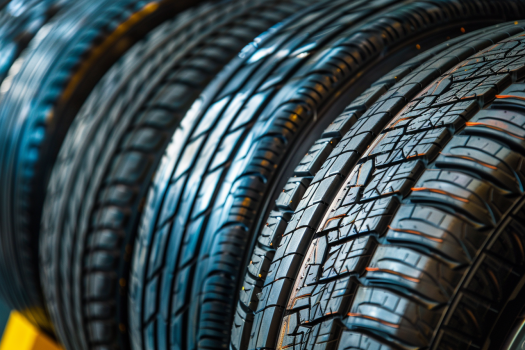Last Updated on August 7, 2025
Unraveling the Unique Electric Car Tires Needs of Electric Vehicles
We’re entering the era of electric vehicles. As more consumers and governments prioritize low emissions and eco-friendly transportation, sales of EVs have skyrocketed. In 2021 alone, global electric vehicle sales increased by 80%.
As these EVs hit the market and roads, consumers must understand that they differ from gas-powered vehicles. They’re built differently, so they have different requirements – especially regarding their tires.
Electric car tires are specifically designed to enhance the performance of electric vehicles and offset certain risks. Although you can technically put regular tires on your Tesla or another EV, it’s not recommended. Doing so could negatively affect your driving experience and the car’s performance.
Electric Car Tires: Why They Differ from Regular Tires
The electric vehicle (EV) revolution is underway, and more drivers are making the eco-conscious choice to go electric. But did you know electric cars have unique tire needs that set them apart from conventional vehicles?
As electric cars become increasingly popular, it’s crucial to understand the distinct requirements of electric car tires and how they can impact your EV’s performance.
In this guide, we’ll unravel the differences between electric car tires and regular tires, helping you make informed choices to optimize your electric vehicle’s driving experience.
The Unique Demands of Electric Vehicles
Electric cars are designed efficiently and sustainably, and their tire needs reflect these priorities. Here’s why electric car tires differ from regular tires:
1. Low Rolling Resistance
Electric cars rely on efficient energy transfer, and one key aspect of this is low rolling resistance. Electric car tires are designed to minimize resistance, ensuring less energy is wasted as the tires roll. This efficiency contributes to longer battery life and improved range.
2. Silent Ride
Electric vehicles are known for their quiet operation, and tire technology plays a role in maintaining this peaceful driving experience. Electric car tires are engineered to reduce road noise, enhancing the serenity of the ride.
3. Optimized Tread Patterns
Electric car tires often feature unique tread patterns designed for EVs. These patterns prioritize grip, stability, and efficient water dispersion while maintaining low rolling resistance. They are tailored to the specific demands of electric vehicle driving.
4. Weight Distribution
Electric cars tend to have their heavy battery packs evenly across the vehicle’s floor. This weight distribution impacts tire wear and handling. Electric car tires are designed to distribute this weight evenly, ensuring balanced tire wear and stable performance.
5. Enhanced Efficiency
EV tires are crafted to contribute to the overall efficiency of the electric vehicle. They help maximize energy use, optimize regenerative braking, and improve driving efficiency.

Choosing the Right Electric Car Tires
Selecting the appropriate tires for your electric car is essential for maximizing performance and efficiency. Here are some factors to consider:
- Tire Type: Look for electric car tires designed explicitly for EVs or those with low rolling resistance.
- Tire Size: Ensure your tire size matches your vehicle’s specifications.
- Season: Consider whether you need all-season, summer, or winter electric car tires, depending on your driving conditions.
- Tread Pattern: Choose a tread pattern that aligns with your driving style and climate.
The Unique Tire Needs of Electric Vehicles: Why Electric Car Tires Matter
Electric car tires are not your average tires, and here’s why they matter. When you drive an electric vehicle (EV), you’re experiencing a different kind of ride with unique demands.
Every aspect plays a significant role in your EV’s performance, from the weight of EVs to the need for enhanced traction, quietness, and even the shape of the tires.
In this article, we’ll delve into the world of electric car tires, exploring why they are essential for maximizing your electric vehicle’s efficiency and safety.
Let’s dive a little deeper into why tires for electric cars are different from traditional tires.
1) Electric Vehicles Weigh More
Electric car tires are uniquely designed to handle the weight of electric vehicles. Electric vehicles weigh substantially more than regular vehicles due to their heavy batteries.
More than a third of EVs weigh over 2,000 kg (more than 4,400 pounds). On the other hand, average-sized gas-powered vehicles tend to weigh under 3,000 pounds. Only large gas-powered SUVs rival the weight of an average electric-powered car.
An EV battery alone can weigh up to 1,000 pounds. A gas-vehicle engine typically weighs between 165 and 450 pounds (depending on the number of cylinders).
Although an EV can use regular tires, the battery weight can cause the tires to wear out quickly. Electric vehicle owners are better off picking EV-specific tires that can withstand the battery’s weight and the car’s performance.
2) Electric Vehicles Need Tires With More Traction
Another reason for EV tires’ purposeful design is that electric vehicles need more reliable, intense traction.
Electric vehicles have more torque than regular cars. As a result, they also have higher traction needs. When the EV accelerates quickly, as soon as the pedal is pressed, it needs strong traction to promote safe steering and braking.
Electric car tires are designed with stiff, expansive center rib patterns. This reduces the chances of slippage and provides an extra degree of grip on the road. Most EV tires also have interlocking grooves in the tread pattern, which helps prevent hydroplaning in wet conditions.
When EV drivers ignore the benefits of electric vehicle tires, they increase their likelihood of skidding and losing their grip on the road – especially in bad weather.
3) Regular Tire Noise Sounds Even Louder
Electric vehicles prioritize different elements than most gas-powered cars and SUVs. For instance, the creators of Teslas and other EVs strongly emphasize the driving experience. Their products are quiet – and you want an EV tire that enhances that feature.
EVs don’t produce engine noise, so if your vehicle’s tires are noisy, you’ll notice the sound more than you would in a gas-powered car. Most EV owners opt for tires that reduce road noise via sound-absorbing foam and rubber compounds.
You could choose to look for regular tires that are relatively quiet, but an EV-specific tire will already be designed for low noise and offer a host of other benefits.
4) Tire Shape Can Increase or Decrease an EV’s Range
Tires for electric vehicles are usually shaped differently than most traditional tires. You’ll notice they tend to be taller and narrower. That’s a purposeful design choice meant to reduce rolling resistance and increase the range capabilities of EVs.
Although wide tires are generally considered better for handling, they also increase a car’s frontal area and aerodynamic drag. EV owners need ways to maximize their range, and choosing a narrower EV tire can help.
The maximum range for electric vehicles is around 400 miles per charge, but on average, most last for about 250 miles. If owners want to ensure they get the best range possible for their vehicle, investing in electric car tires specifically designed to do so is a good idea.
5) Electric Vehicles Need Extra Durable Tires
Lastly, electric vehicle tires differ from traditional tires because electric vehicles require intense durability. The weight of the car, combined with higher instant torque levels, results in some harsh wear and tear on the tires.
Generally, electric vehicle owners will need to replace their tires more often than regular vehicle owners – likely every 20,000 to 25,000 miles. However, picking EV-specific tires can help you get the best bang for your buck. They’re created with high-loading resin and silica extracted from natural resources to make them highly durable and longer-lasting.
Electric vehicle tires’ more robust, durable compounds also assist with EV power delivery. If you’re an EV owner who plans to take advantage of the vehicle’s speed and acceleration capabilities, you’ll want a tire that can keep up with the demands.
Find the Right Electric Vehicle Tire for You
When picking the best tire for your electric vehicle, you’ll want to do adequate research and understand what your EV needs. That’s the best way to improve your vehicle’s performance and stay safe.
Fortunately, Tires Easy is here to help you with your research. We’re at the forefront of tire news and innovation, including updates on the best tires for electric cars. Our site boasts a substantial selection of electric vehicle tires, and we’re happy to help you find the right tire brand, price, and features.
Elevate Your Electric Vehicle Experience with Tires Easy
At Tires Easy, we understand the unique tire needs of electric vehicles. We offer a selection of electric car tires that cater to these demands, allowing you to optimize your EV’s performance and efficiency. Don’t compromise on the driving experience of your electric car—upgrade to the right electric car tires today.
The perfect electric car tires enhance your electric vehicle’s performance and efficiency. Visit Tires Easy to explore our range of electric car tires tailored to the unique needs of your EV. Drive confidently, knowing you’ve chosen tires to complement your electric vehicle’s capabilities.
Conclusion
In conclusion, electric car tires are not just a simple replacement for regular tires; they are a tailored solution for the unique demands of electric vehicles. Their ability to handle the increased weight, provide enhanced traction, reduce road noise, optimize aerodynamics, and offer exceptional durability makes them a critical component of electric car performance.
As more drivers transition to electric vehicles, understanding the significance of electric car tires becomes essential. Choosing the right electric car tires ensures that your EV operates at its best, maximizing efficiency, safety, and the overall driving experience.
For more insights into electric vehicles and maximizing their performance, check out these related blogs:
FAQs
-
Automotive Specialist
-
Proofreader
-
Writer









